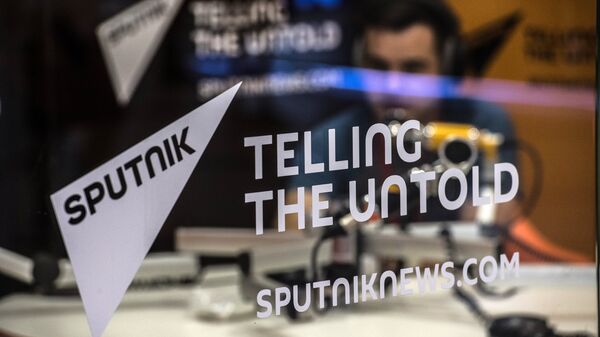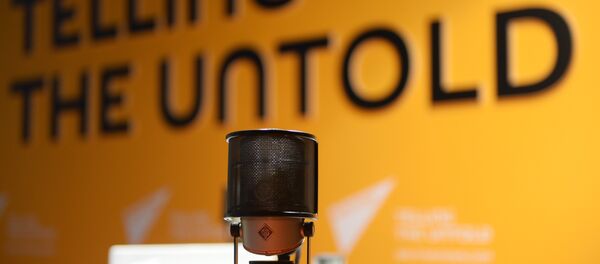MOSCOW (Sputnik) — The US authorities’ repeated attempts to silence Sputnik and RT by keeping the story of alleged Russian interference in the 2016 US presidential election alive, including Tuesday’s congressmen letter calling for probe into Sputnik Radio’s alleged role in the vote, would be met with a "furious" response from the US alternative media, representatives of the media told Sputnik.
The congressmen failed to give any arguments as to how Sputnik radio managed to affect the presidential election after it had already passed. Instead, they cited an article in The New York Times newspaper, titled "RT, Sputnik and Russia’s New Theory of War," and suggested that the radio station "was used as part of the Kremlin's effort to influence the 2016 presidential election" and that "the Russian government may be using our country's own airwaves to undermine our democracy."
Possible backlash from US alternative media
Charles Bausman, media expert and editor at Russia Insider news website, told Sputnik that over the past years, the proportion of alternative media read by US citizens reached some 40 percent. The expert noted that both RT and Sputnik are being closely read, re-broadcast and re-translated by such media and the public, so an attempt to shut them down would be met with a harsh reaction from the country’s alternative media, which are currently highly influential within US society.
"It’s RT and Sputnik that are providing raw material for American alternative media who can discuss it, analyze it and spread it around. So, if somebody [in the United States] tries to close down RT and Sputnik, the American alternative media is going to be furious, and it’s hugely influential now," Bausman said.
Bausman suggested that these recent US efforts to silence RT and Sputnik will fail just like similar attacks did in the past.
Phil Butler, CEO at both Pamil Visions PR firm and Our Russia media project, said he feels that the attacks by US authorities on any media organization simply for having an opposing view is a clear and present danger to freedom of information that every US citizen should understand.
"If tabloids and biased American media can operate with something akin to impunity, then Sputnik or other independent foreign media should be judged by the same rules. If these politicians are successful here, the precedent will certainly cause future infringements where the ‘narrative’ is not followed," Butler pointed out.
The expert went on to characterize the US congressmen’s letter about Sputnik radio as "one-sided."
"It is these politicians who are experts in making use of disinformation and propaganda to achieve their hidden agendas. What they are trying to do to Sputnik is dangerous for more reason than one. First and foremost, if successful, the blackballing will set a deadly precedent. These people are lawyers to the core, and they know this," Butler suggested.
As for the freedom of press in Russia, the expert noted that Moscow would not ever take the "low road" on the issue, as such an option was neither in President Vladimir Putin's character nor the Russian way of creating policy.
"’Tit for tat’ happens sometimes, but I believe Russians admire the 'Freedom of the Press' aspect of our constitution as much as most Americans do," the expert pointed out.
US intelligence campaign
Bausman suggested that the recent attacks on RT and Sputnik, including Tuesday’s letter, were just the latest stage in a wider US campaign to counter these media over their "fantastic" success in challenging US analogues, the main "soft weapon" used by the country’s intelligence community.
"It is important to understand that this big article in the New York Times was definitely a planted article by the US intelligence, there is no question. Things like that do not get written at a particular time just by coincidence. There was definitely a collusion between editors in NYT and this latest effort to try to silence RT and Sputnik," Bausman explained.
As far as the possible probe into Sputnik radio’s activities is concerned, the expert suggested that it would end up "just as another investigation, not having any consequences."
"Part of what’s happening [in the United States] is that this is just another effort by the Democrats to push their strategy of keeping their story of Russian interference in the US democracy alive. But that train has also already left the station. Nobody cares about it anymore, they couldn’t make it for over eight months or so, and they won’t be able to make it. The system is still trying to keep that story alive, but it’s already dead. It’s a total waste of time," Bausman concluded.
The latest accusations against Sputnik Radio came just days after the Yahoo News portal reported, citing its sources, that the US Federal Bureau of Investigations (FBI) had questioned former Sputnik's correspondent Andrew Feinberg as part of its investigation into whether Sputnik was acting as a tool of so-called Kremlin propaganda in violation of the US Foreign Agents Registration Act (FARA). The portal also claimed that the FBI had access to Sputnik's working correspondence from Feinberg and another former employee of Sputnik's Washington bureau, Joseph John Fionda.
The reports about the probe emerged amid the House of Representatives' discussions on a bill aimed at amending requirements for the registration of foreign agents under FARA. The bill, above all, empowers US Department of Justice, including the FBI, to identify and prosecute organizations that "illegally" try to influence the political processes in the United States.
Moreover, on September 11, RT press service said that a contractor for RT in the United States received a letter from US authorities to register under the FARA over its work for the broadcaster.
Over recent years, Russian media outlets broadcasting in the United States have been facing multiple accusations of allegedly spreading fake news and attempting to influence public life. The US intelligence community has claimed that Russia used its media outlets to swing the outcome of US November presidential election in favor of Donald Trump, but have failed to provide any evidence to back their claims. Russian officials have repeatedly stressed that Moscow does not interfere in other states’ domestic affairs, refuting allegations of meddling.
Reaction of journalists and activists
Sputnik and RT Editor-in-Chief Margarita Simonyan mocked the US congressmen's allegations that Sputnik Radio had a role in meddling with the 2016 US presidential election.
"To accuse a radio which had started its broadcast two months ago of interfering in last years' election is the new intellectual height, reached by the US establishment. [Former White House spokeswoman Jen] Psaki rises in applause," Simonyan said.
Shafir told Sputnik that as usual, they were a group of people who wanted to participate in a politically significant event in their country but could not see their role in it.
"As they do not have any competence in this area, they often find themselves in an awkward situation. Like the three amazing US congressmen who had, generally speaking, requested a probe into Sputnik Radio's effect on the course of the US election, despite the radio station had went on air later," Shafir said, emphasizing that the lawmakers only cited one article in a newspaper to support their claims.
Director of the Moscow Bureau for Human Rights and member of the Council for Civil Society and Human Rights Alexander Brod told Sputnik that the Russian media outlets were being "demonized" by the US officials. Media cannot meddle in election campaigns, and may only provide information about them, Brod pointed out.
"I consider what they are saying now about the Russian media as another unfriendly step aimed at hindering the work of the Russian media, at continuing the anti-Russian hysteria," Brod said.
If the officials believe that media somehow misinformed their audience or violated any ethical or legal norms, they needed to prove it in court, Brod pointed out.






